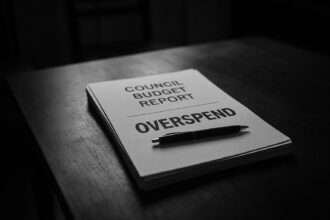The new Reform Party mayor of Grimsby, Dame Andrea Jenkyns, has ignited a heated debate by demanding that asylum seekers be moved into tents instead of rented accommodations. Her comments come amid surging immigration numbers, strained housing provision, and escalating costs for taxpayers, revealing deep divisions in UK communities confronting these pressures.
A recent speech delivered by Dame Andrea Jenkyns, the new mayor from the Reform Party, has ignited significant discussion regarding the mishandling of asylum seekers in the UK. Speaking to a fervent crowd in a town hall in Grimsby, once a proud fishing hub, Jenkyns took a resolute stance against illegal immigration, advocating for the relocation of asylum seekers from hotels and private dwellings into tents. “Tents, not rents,” she proclaimed, tapping into public frustration and reflecting her party’s mounting influence in local politics. This statement underscores a critical viewpoint amid growing discontent with the government’s inability to control immigration.
However, this assertive rhetoric contrasts sharply with the real experiences faced by asylum seekers. Not far from the town hall, we meet Abdul, a 27-year-old Afghan who has been living in a four-bedroom house provided by the state. After a tumultuous journey spanning four years in Belgium and a denied asylum application, he seeks a brighter future in the UK, hoping to bring his mother to safety as conditions in Afghanistan deteriorate. This scenario illuminates the complexities surrounding those who seek refuge, calling into question the viability of Jenkyns’s comments.
While the government claims to be taking a firm line on asylum—promising to slash immigration—this has not translated into fewer arrivals on British shores. Since 2018, over 150,000 migrants have crossed the Channel, a trend that shows no signs of abating. Moreover, the UK’s asylum accommodation system is buckling under pressure, with the demand for housing nearly doubling since late 2019, leading to an escalating financial burden for taxpayers, projected to reach £15 billion over the coming decade.
The situation is exacerbated by the suspicious profits enjoyed by private companies managing asylum accommodation, such as Serco and Mears Group, who see profits soaring even as the public bears the burden of increasingly costly services. Critics rightly contend that public funds should not line the pockets of private entities dealing with humanitarian issues. As Labour ministers express concerns regarding soaring payments for these contracts, the urgency for a comprehensive reassessment is becoming unavoidable, especially with negotiations looming in 2026.
Despite the government’s attempts to reduce costs by moving asylum seekers from hotels to less luxurious options, the National Audit Office warns that such measures may backfire, leading to even greater expenditures. Initial plans aimed at saving millions are now expected to result in significant financial burdens tied to refitting military bases and other facilities. The strain on already beleaguered local communities, particularly in places like Grimsby that are grappling with poverty, is another critical issue as the government pushes for private landlords to accommodate asylum seekers.
These exchanges reveal a worrying trend about the social cohesion within communities facing rapid demographic changes. Abdul’s account of interactions in Grimsby highlights a worrying shift in social dynamics, where an environment once filled with camaraderie is turning into one marked by isolation. Many locals feel increasingly disillusioned with demographic shifts, and while the arrival of migrants often garners blame for tensions, individuals like Abdul merely aspire to find acceptance and support amid adversity.
As the UK grapples with soaring immigration numbers, public sentiment is shifting towards a more critical stance regarding the government’s handling of asylum seekers. The pressing challenges of accommodating a growing population of asylum seekers demand not only pragmatic solutions but also a reevaluation of our national values—particularly in how we treat the vulnerable and how we safeguard local communities against the pressures of change. With ongoing debates and likely policy recalibrations ahead, the fate of both asylum seekers and local residents hangs in the balance.
Source: Noah Wire Services
- https://www.dailymail.co.uk/debate/article-14720617/small-boats-migrants-moved-hotel-houses-paid-you.html?ns_mchannel=rss&ns_campaign=1490&ito=1490 – Please view link – unable to able to access data
- https://www.ft.com/content/27aab256-807f-4a3d-bc54-8f302e468e9a – UK ministers are considering using break clauses in asylum housing contracts with companies like Serco, Mears, and Clearsprings Ready Homes to renegotiate or annul agreements. These contracts, initiated in 2019 and due for renegotiation in 2026, have reportedly yielded unforeseen profits for the companies due to escalating asylum system demands. The Home Office has been competing with other departments for accommodations, driving costs up. Contracts worth £4.6bn across various UK regions include break clauses after seven years. The companies assert their profits align with market standards and contractual stipulations, with return provisions for excess earnings.
- https://www.ft.com/content/a9de3d15-140a-44e7-8e0e-9189b69e3bd0 – Clearsprings, a company providing housing for asylum seekers, has seen a significant increase in profits due to high demand for asylum accommodations, with pre-tax profits rising 60% to £119 million. This surge in profitability has drawn the attention of new Labour ministers, who are concerned about the large sums paid to private companies for handling asylum housing, leading to calls for potential renegotiation or termination of contracts in 2026. High demand has been attributed to political and economic turmoil in various countries, causing more asylum applications in the UK. The company’s operating margin has also increased significantly. However, government policies aimed at reducing asylum numbers might impact future demand for these services. Amid ongoing social tensions and riots relating to asylum housing, the government has pledged to cease using hotels and mass accommodation sites. The cost for asylum accommodation has escalated due to a backlog of claims, and there are calls from think tanks to reverse outsourcing to private firms and decentralize budget control to regional authorities.
- https://www.reuters.com/world/uk/relocating-uk-asylum-seekers-hotels-will-not-save-money-watchdog-says-2024-03-20/ – The British government’s plan to relocate asylum seekers from hotels to military bases and other facilities will cost taxpayers more than keeping them in hotels, the National Audit Office (NAO) stated. Originally aimed at reducing annual housing costs of 3 billion pounds, the government initially believed the plan would save 94 million pounds, but now estimates an additional cost of 46 million pounds. The increased costs are partly due to underestimating the expenses of converting former military bases. The total expense of establishing and running these new sites is projected to reach 1.2 billion pounds by 2034. Despite the government’s claim of minimizing local impact, the Labour Party criticized the approach, highlighting the excessive spending on asylum hotels and the rising costs of the new sites. The controversy extends to plans like housing asylum seekers on barges, which have faced human rights criticisms. Prime Minister Rishi Sunak promotes a stricter policy on asylum seekers, including a still-pending deportation plan to Rwanda.
- https://www.serco.com/uk/careers/aasc – Serco manages the Asylum Accommodation and Support Services Contract (AASC) on behalf of the Home Office for the Midlands and East of England. They provide vital accommodation and support services for people while their asylum claim is being processed, managing a substantial property portfolio. Serco has been providing housing and support for asylum seekers in the UK since 2012, ensuring safety and respect for some of the most vulnerable people in society while they await news on their immigration status. With over 7,000 properties in their portfolio, they ensure all accommodation is safe and habitable and in accordance with the Decent Homes Standard.
- https://www.london.gov.uk/who-we-are/what-london-assembly-does/questions-mayor/find-an-answer/asylum-seekers-london-hotels – As of 30 September 2024, there were 14,310 people seeking asylum accommodated by the Home Office in contingency accommodation in London, which are hotels. Data on the number of hotels in London are owned by the Home Office and the Greater London Authority (GLA) does not have permission to share these publicly. This information was provided in response to a question by Alex Wilson of Reform UK to the Mayor during the Mayor’s Question Time on 16 January 2025.
- https://www.crowe.com/uk/insights/asylum-accommodation-contracts – The UK is obliged to provide accommodation and related services to asylum seekers who would otherwise be destitute. The Home Office awarded Asylum Accommodation and Support Contracts (AASC) in January 2019, which commenced in September 2019, replacing the prior COMPASS contracts. Three companies were awarded specific regional coverage: Serco for the Midlands and East of England and the North West; Mears Group for the North East, Yorkshire and Humberside, Scotland, and Northern Ireland; and Clearsprings Ready Homes for the South and Wales. These providers, in turn, make contracts with hotels but remain responsible for related services, property maintenance plans, and inspections. The AASC contracts run through to September 2029, and when announced, the Home Office estimated that the value of these contracts would be £4 billion.
Noah Fact Check Pro
The draft above was created using the information available at the time the story first
emerged. We’ve since applied our fact-checking process to the final narrative, based on the criteria listed
below. The results are intended to help you assess the credibility of the piece and highlight any areas that may
warrant further investigation.
Freshness check
Score:
8
Notes:
The narrative references recent events and figures, such as over 150,000 migrants crossing the Channel since 2018, and ongoing debates about asylum policies. However, the lack of specific dates for the speech and the mention of upcoming negotiations in 2026 suggests that the information might not be entirely up-to-date.
Quotes check
Score:
6
Notes:
The narrative includes a direct quote from Dame Andrea Jenkyns, but there is no clear reference to when or where this quote was first published. Without further research, it is difficult to verify if this is an original source or a repetition from another report.
Source reliability
Score:
6
Notes:
The narrative originates from the Daily Mail, a publication known for its conservative stance. While it is a well-known source, its reliability can be questioned due to its editorial bias.
Plausability check
Score:
9
Notes:
The claims about asylum seekers’ accommodations and the pressure on local communities are plausible given the context of immigration trends and public discourse. However, specific financial figures and projections could not be verified.
Overall assessment
Verdict (FAIL, OPEN, PASS): OPEN
Confidence (LOW, MEDIUM, HIGH): MEDIUM
Summary:
The narrative is generally plausible, reflecting current debates on UK immigration policies. However, the reliability of the source and the lack of specific details about the quotes and financial projections mean the overall assessment is open to further verification.













